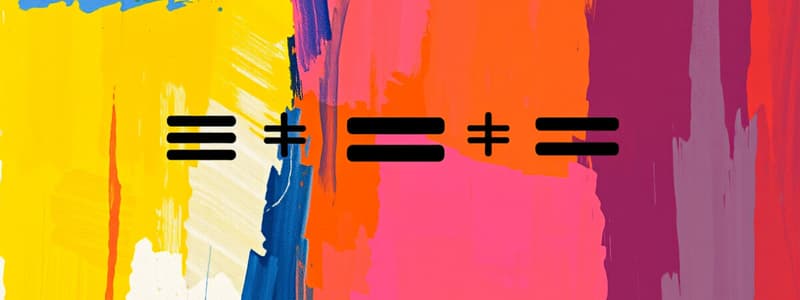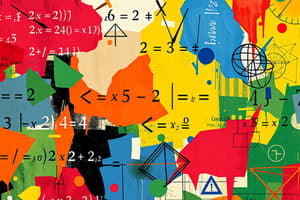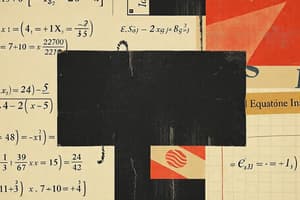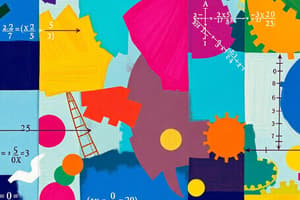Podcast
Questions and Answers
What is a constant?
What is a constant?
- An equation
- A value that does not change (correct)
- A variable that can change
- An inequality
What is an inequality?
What is an inequality?
A mathematical sentence that compares quantities
What is the solution of an inequality?
What is the solution of an inequality?
A value that makes the inequality true
What is a solution set?
What is a solution set?
What does the graph of an inequality represent?
What does the graph of an inequality represent?
An open circle on a number line includes the point.
An open circle on a number line includes the point.
A closed circle on a number line includes that point.
A closed circle on a number line includes that point.
What are properties of equality?
What are properties of equality?
What happens when you change the direction of the sign?
What happens when you change the direction of the sign?
What is a compound inequality?
What is a compound inequality?
Greater than means ___
Greater than means ___
Less than means ___
Less than means ___
Greater than or equal to means ___
Greater than or equal to means ___
Less than or equal to means ___
Less than or equal to means ___
What is an equation?
What is an equation?
What is an expression?
What is an expression?
What are integers?
What are integers?
What are consecutive integers?
What are consecutive integers?
What are like terms?
What are like terms?
What does infinitely many solutions mean?
What does infinitely many solutions mean?
What does no solution mean?
What does no solution mean?
Whole numbers include ___
Whole numbers include ___
What is the Addition Property of Equality?
What is the Addition Property of Equality?
What is the Subtraction Property of Equality?
What is the Subtraction Property of Equality?
What is the Multiplication Property of Equality?
What is the Multiplication Property of Equality?
What is the Division Property of Equality?
What is the Division Property of Equality?
What is the Substitution Property of Equality?
What is the Substitution Property of Equality?
What is the Distributive Property?
What is the Distributive Property?
What are natural numbers?
What are natural numbers?
What are rational numbers?
What are rational numbers?
What are irrational numbers?
What are irrational numbers?
What are real numbers?
What are real numbers?
What is the order of operations?
What is the order of operations?
What is a variable?
What is a variable?
What is a coefficient?
What is a coefficient?
What is a term?
What is a term?
No less than means ___
No less than means ___
Fewer than means ___
Fewer than means ___
At least means ___
At least means ___
Flashcards are hidden until you start studying
Study Notes
Key Algebra Concepts
- Constant: A value that remains unchanged throughout a mathematical context.
- Inequality: A mathematical expression that signifies the comparison of two quantities.
- Solution of an Inequality: A specific value that satisfies the conditions of the inequality.
- Solution Set: The complete collection of all possible solutions for a particular inequality.
- Graph of an Inequality: Visual representation that illustrates the solution set on a number line.
Graphical Representations
- Open Circle: Represents a point that is excluded from the solution on a number line.
- Closed Circle: Indicates a point that is included in the solution on a number line.
Properties of Equality
- Properties of Equality: Principle stating that operations performed on one side of an equation must be reflected on the other side.
- Change the Direction of the Sign: Multiplying or dividing both sides of an inequality by a negative number flips the inequality sign.
Types of Inequalities
- Compound Inequality: Combination of two inequalities connected by "and" or "or".
- Greater Than: Refers to all values exceeding a specified number.
- Less Than: Pertains to values that fall below a given number.
- Greater Than or Equal To: Encompasses numbers larger than or exactly equal to a specified value.
- Less Than or Equal To: Covers numbers smaller than or equal to a certain value.
Equations and Expressions
- Equation: A mathematical expression that equates two sides, featuring an equals sign.
- Expression: A collection of numbers, variables, and operations without an equals sign.
Number Types
- Integer: Whole numbers that include positive numbers, negative numbers, and zero.
- Consecutive Integers: Integers that follow in sequence, such as 1, 2, 3.
- Whole Numbers: Non-negative integers including zero.
- Natural Numbers: Counting numbers starting from 1 and incrementing positively.
- Rational Numbers: Values expressed as a ratio of integers, with a non-zero denominator.
- Irrational Numbers: Numbers that cannot be represented as ratios of integers.
- Real Numbers: All numbers comprising both rational and irrational types.
Algebraic Principles
- Addition Property of Equality: Adding the same value to both sides of an equation preserves equality.
- Subtraction Property of Equality: Subtracting the same value from both sides keeps the equation balanced.
- Multiplication Property of Equality: Multiplying both sides by the same number retains equality.
- Division Property of Equality: Dividing both sides by the same non-zero number maintains equality.
- Substitution Property of Equality: Allows for the replacement of an equal value without altering the equation.
- Distributive Property: States that multiplying a number by a sum is equivalent to summing the products of each addend.
Additional Vocabulary
- Variable: A symbol representing a quantity that can vary or change.
- Coefficient: A numerical factor that multiplies a variable in an algebraic expression.
- Term: An individual component of an algebraic expression, which can be a number, variable, or combination of both.
- Order of Operations: Prescribed sequence for performing calculations to ensure consistent results.
- Infinitely Many Solutions: Indicates that any value for the variable qualifies as a solution to the equation.
- No Solution: Suggests that there exists no possible number that can satisfy the equation.
Important Inequality Terms
- No Less Than: A phrase indicating a minimum threshold to be met.
- Fewer Than: Implies a restriction that is strictly less than a specified amount.
- At Least: Signifies a lower boundary that must be met or exceeded.
Studying That Suits You
Use AI to generate personalized quizzes and flashcards to suit your learning preferences.




